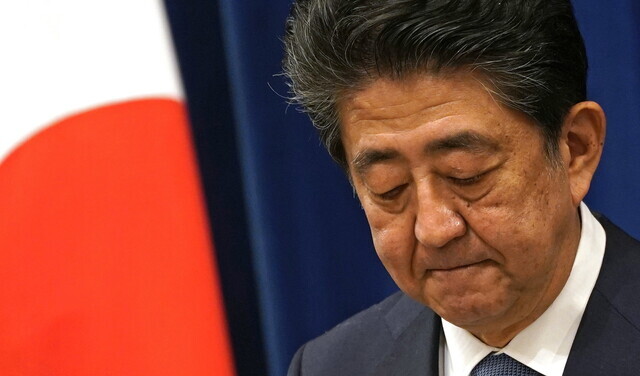hankyoreh
Links to other country sites 다른 나라 사이트 링크
[Editorial] Abe’s resignation hopefully marks a turning point in S. Korea-Japan relations

On Aug. 28, Japanese Prime Minister Shinzo Abe announced his intent to resign. In a press conference that day, he explained that he had experienced a “recurrence of ulcerative colitis in early August,” and that he “concluded I cannot continue on as the prime minister because this is not a situation in which I am capable of meeting the Japanese public’s expectations.” His resignation came as a shock even to his associates. Abe will continue to perform his duties as the prime minister until the Liberal Democratic Party (LDP) selects his successor.
Abe is the longest consecutively serving prime minister in Japanese history, having served for over seven years and eight months since he was first reelected in December 2012. If his first term is also counted, he has been in power for a total of eight and a half years -- but the general assessment of his performance has been negative. As his unchallenged leadership has persisted over time, the so-called “sontaku culture” of officials exclusively taking their cues from the Prime Minister’s Office has only worsened.
One scandal after another has erupted involving Abe’s associates benefiting from preferential treatment. Abe’s apparent omnipotence came crashing down all of a sudden this year amid Japan’s fumbled response to the COVID-19 pandemic and the postponement of the Tokyo Olympics. Despite his attempts to improve the Japanese economy’s constitution through his “Abenomics” policies, the virus resulted in Japan recording its worst growth rate since World War II.
While Abe has been in power, Japan has experienced a sharp lurch to the right. Abe worked to strengthen the US-Japan alliance and pushed through legislative measures to establish collective self-defense capabilities; he has also strongly advocated amending Article 9 of Japan’s Peace Constitution.
Most regrettably of all, Abe deeply damaged relations with South Korea by politically exploiting anti-Korean sentiments in Japan. He attacked a South Korean Supreme Court ruling ordering compensation for forced labor mobilization as a “violation of international law,” imposed retaliatory export controls in response, and doggedly worked to sabotage the Korean Peninsula peace process.
Hopefully, his resignation will mark a turning point in improving South Korea-Japan relations from the worst state they have been in since their establishment. Some of the names being mentioned as possible successors include former LDP Secretary General Shigeru Ishiba, LDP Policy Research Council Chairperson Fumio Kishida, and Chief Cabinet Secretary Yoshihide Suga. Whoever does become the prime minister must not stand in the way of Korean forced labor victims receiving the apology and compensation they have long been waiting for from Japanese companies. Instead, they will need to work toward reaching a diplomatic solution.
The South Korean government, for its part, should use Abe’s departure as an opportunity to work actively toward improving relations with Japan. Seoul will need to take preemptive steps in establishing a “two-track” strategy to achieve progress with diplomatic and economic issues while also resolving historical ones. If only for the sake of preparing for the major shockwaves of the new US-China “Cold War” and making headway with the Korean Peninsula peace process, we cannot afford to leave relations between Seoul and Tokyo in their current state.
Please direct comments or questions to [english@hani.co.kr]

Editorial・opinion
![[Editorial] Penalties for airing allegations against Korea’s first lady endanger free press [Editorial] Penalties for airing allegations against Korea’s first lady endanger free press](https://flexible.img.hani.co.kr/flexible/normal/500/300/imgdb/original/2024/0502/1817146398095106.jpg) [Editorial] Penalties for airing allegations against Korea’s first lady endanger free press
[Editorial] Penalties for airing allegations against Korea’s first lady endanger free press![[Editorial] Yoon must halt procurement of SM-3 interceptor missiles [Editorial] Yoon must halt procurement of SM-3 interceptor missiles](https://flexible.img.hani.co.kr/flexible/normal/500/300/imgdb/child/2024/0501/17145495551605_1717145495195344.jpg) [Editorial] Yoon must halt procurement of SM-3 interceptor missiles
[Editorial] Yoon must halt procurement of SM-3 interceptor missiles- [Guest essay] Maybe Korea’s rapid population decline is an opportunity, not a crisis
- [Column] Can Yoon steer diplomacy with Russia, China back on track?
- [Column] Season 2 of special prosecutor probe may be coming to Korea soon
- [Column] Park Geun-hye déjà vu in Yoon Suk-yeol
- [Editorial] New weight of N. Korea’s nuclear threats makes dialogue all the more urgent
- [Guest essay] The real reason Korea’s new right wants to dub Rhee a founding father
- [Column] ‘Choson’: Is it time we start referring to N. Korea in its own terms?
- [Editorial] Japan’s rewriting of history with Korea has gone too far
Most viewed articles
- 1[Editorial] Penalties for airing allegations against Korea’s first lady endanger free press
- 260% of young Koreans see no need to have kids after marriage
- 3Months and months of overdue wages are pushing migrant workers in Korea into debt
- 4Bills for Itaewon crush inquiry, special counsel probe into Marine’s death pass National Assembly
- 51 in 3 S. Korean security experts support nuclear armament, CSIS finds
- 6[Guest essay] Maybe Korea’s rapid population decline is an opportunity, not a crisis
- 7[Reporter’s notebook] In Min’s world, she’s the artist — and NewJeans is her art
- 8[Editorial] Yoon must halt procurement of SM-3 interceptor missiles
- 9S. Korea discusses participation in defense development with AUKUS alliance
- 10Cracks found in containment building of UAE nuclear power plant built by S. Korean companies